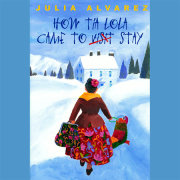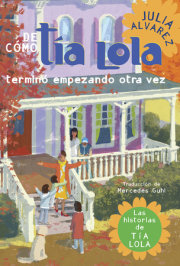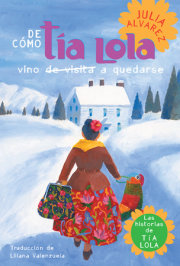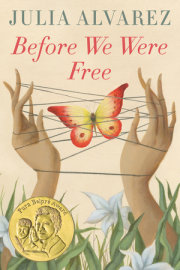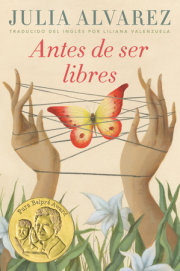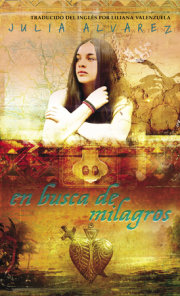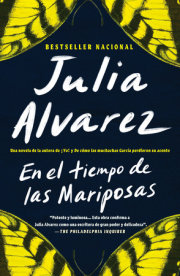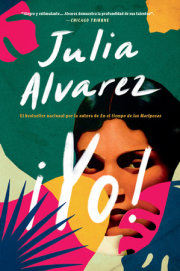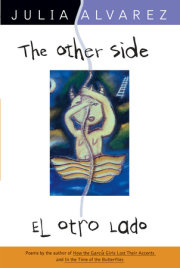"Why can't we just call her Aunt Lola?" Miguel asks his mother. Tomorrow their aunt is coming from the Dominican Republic to visit with them in their new home in Vermont. Tonight they are unpacking the last of the kitchen boxes before dinner.
"Because she doesn't know any English," his mother explains.
"Tia is the word for aunt in Spanish, right, Mami?" Juanita asks. When their mother's back is turned, Juanita beams Miguel a know-it-all smile.
Their mother is gazing sadly at a blue bowl she has just unpacked. "So you see, Miguel, if you call her Aunt, she won't know you're talking to her."
That's fine, Miguel thinks, I won't have much to say to her except "Adios!" Goodbye! But he keeps his mouth shut. He knows why his mother is staring at the blue bowl, and he doesn't want to upset her in the middle of a memory.
"So, please, Miguel," his mother is saying, "just call her Tia Lola. Okay?"
Miguel kind of nods, kind of just jerks his head to get his hair out of his eyes. It can go either way.
It is the last day of January. Four weeks ago, during Christmas break, they moved from New York City into a farmhouse Mami rented from a Realtor by phone. Miguel and Juanita's parents are getting a divorce, and Mami has been hired to be a counselor in a small college in Vermont. Papi is a painter who sets up department store windows at night in the city.
Every morning, instead of walking to school as they used to do in New York City, Miguel and Juanita wait for the school bus by the mailbox. It is still dark when they board and drive down the dirt road, past their neighbor's sheep farm to town. It is again dark when they get home at the end of the day and let themselves into the chilly house. Mami does not like the idea of Miguel and Juanita being alone without an adult, and that in large part is why she has invited Tia Lola to come for a visit.
Why not ask Papi to come up and stay with them instead? Miguel wants to suggest. He doesn't really understand why his parents can't stay married even if they don't get along. After all, he doesn't get along great with his little sister, but his mother always says, "Juanita's your familia, Miguel!" Why can't she say the same thing to herself about Papi? But Miguel doesn't dare suggest this to her. These days, Mami bursts out crying at anything. When they first drove up to the old house with its peeling white paint, Mami's eyes filled with tears.
"It looks haunted," Juanita gasped.
"It looks like a dump," Miguel corrected his little sister. "Even Dracula wouldn't live here." But then, catching a glimpse of his mother's sad face, he added quickly, "So you don't have to worry about ghosts, Nita!"
His mother smiled through her tears, grateful to him for being a good sport.
After some of the boxes have been cleared away, the family sits down to eat dinner. They each get to pick the can they want to bring to the table: Juanita chooses SpaghettiOs, their mother chooses red beans, and Miguel chooses a can of Pringles. "Only this one night, so we can finish getting settled for Tia Lola," their mother explains about their peculiar dinner. Every night, she gets home so late from work, there is little time for unpacking and cooking. Mostly, they have been eating in town at Rudy's Restaurant. The friendly, red-cheeked owner, Rudy, has offered them a special deal.
"Welcome Wagon Special," he calls it. "Three meals for the price of one and you guys teach me some Spanish." But even Miguel is getting tired of pizza and hot dogs with french fries on the side.
"Thanks for a yummy dinner, Mami," Juanita is saying, as if their mother has cooked all the food and put it in cans with labels marked Goya and SpaghettiOs, then just now reheated the food in the microwave. She always sees the bright side of things. "Can I have some of those chips, Miguel?" she asks her brother.
"This is my can," Miguel reminds her.
"But you can share," his mother reminds him. "Pretend we're at the Chinese restaurant and we share all the plates."
"We're not Chinese," Miguel says. "We're Latinos." At his new school, he has told his classmates the same thing. Back in New York, lots of other kids looked like him. Some people even thought he and his best friend, Jose, were brothers. But here in Vermont, his black hair and brown skin stand out. He feels so different from everybody. "Are you Indian?" one kid asks him, impressed. Another asks if his color wears out, like a tan. He hasn't made one friend in three weeks.
"I didn't say to pretend you're Chinese," his mother sighs, "just to pretend that you're at a Chinese restaurant...." She suddenly looks as if she is going to cry.
Miguel shoves his can of chips over to Juanita--anything to avoid his mother bursting into tears again. She is staring down at her bowl as if she had forgotten it was there underneath her food the whole time. From that blue bowl, Miguel's mother and father fed each other spoonfuls of cake the day they got married. There is a picture of that moment in the white album in the box marked albums/attic that their mother says they might unpack sometime later in the distant future maybe.
Copyright © 2002 by Julia Alvarez. All rights reserved. No part of this excerpt may be reproduced or reprinted without permission in writing from the publisher.



